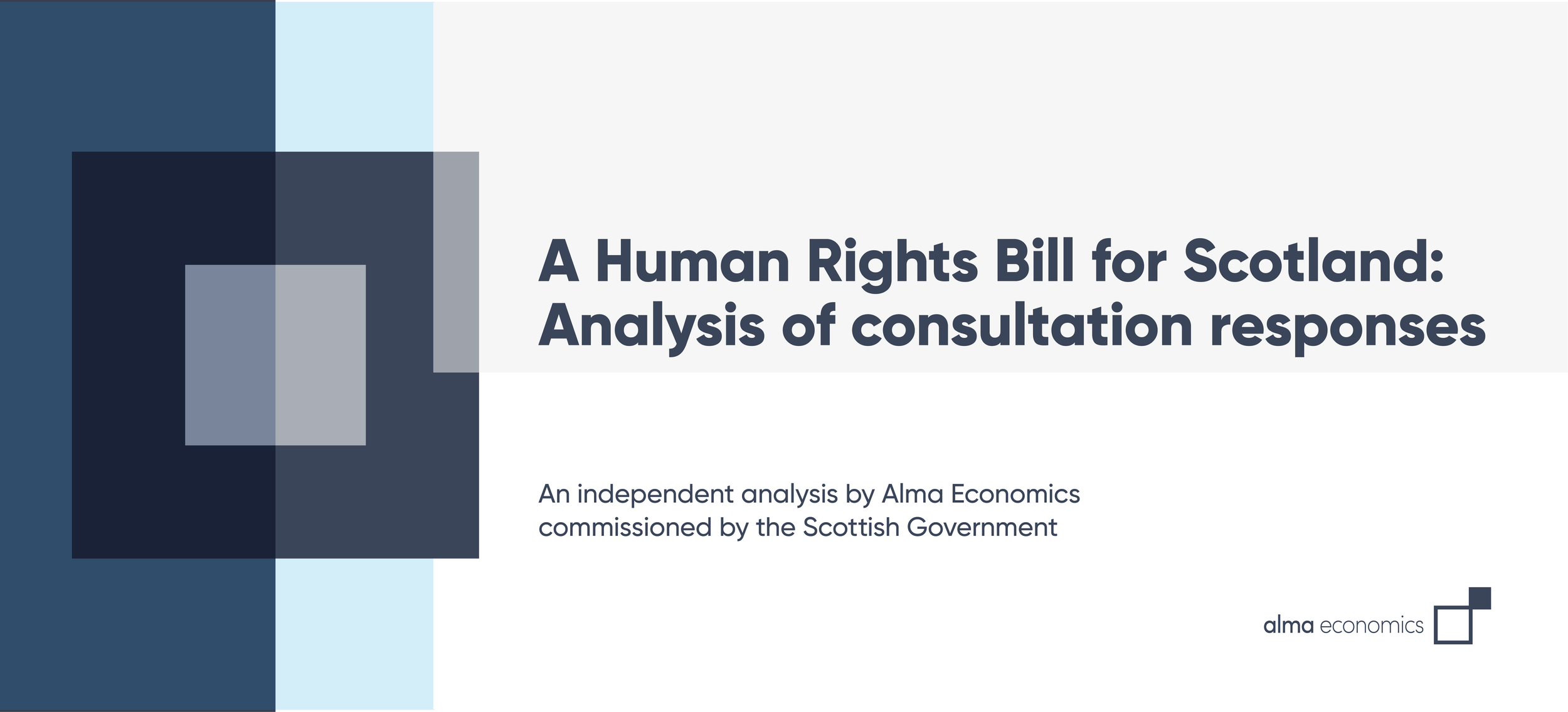Analysis of consultation responses on the new Human Rights Bill for Scotland
In 2018, an independent Advisory Group on Human Rights Leadership was established to examine the impact of Brexit on human rights in Scotland. The Group suggested the establishment of a National Taskforce for Human Rights Leadership which made several recommendations to further protect human rights domestically. Namely, the Taskforce recommended the creation of a new statutory human rights framework for Scotland. In response, the Scottish Government has committed to introduce a new Human Rights Bill for Scotland before the end of the 2023-2024 parliamentary year. The proposed Bill aims to “bring internationally recognised human rights into Scots law” and to enhance existing human rights and equality protections.
To inform the development of the Human Rights Bill, the Scottish Government conducted a public consultation, and Alma Economics was commissioned to analyse the responses. The consultation ran between 15 June and 5 October 2023. It posed 52 questions with a 42 open-text and 10 closed-answer questions. The Scottish Government also led seven public consultation events that took place between 27 July and 19 September 2023.
The questions addressed proposals for the Bill in its entirety, soliciting views on various aspects such as: (i) incorporating the rights mentioned in the UN equality treaties, (ii) recognising the right to a healthy environment, (iii) incorporating further rights and embedding equality, (iv) the duties, (v) ensuring access to justice for rights-holders, and (vi) implementing the Bill as an Act.
Responses to the consultation were accepted through five formats: (i) the Citizen Space online platform, (ii) email (including PDF attachments, Easy Read question responses and child-friendly version responses), (iii) post (hard copy responses, which could be scanned as PDFs), and (iv) by participating in public consultation events (outputs from these events are captured in seven reports that inform this consultation analysis report).
A total of 397 responses were received, 277 of which were submitted through Citizen Space and 120 were sent via email. Respondents included individuals, local councils, civil society organisations, public sector organisations (including non-departmental public bodies (NDPBs)), academic institutions, legal professionals, private bodies, and third-sector service delivery organisations.
Our team calculated descriptive statistics on the closed-answer questions and conducted a thematic analysis to identify common themes extracted from both the open-text questions as well as the seven public consultation events. Some of the recurrent emerging themes that were identified during our analysis are outlined below:
Support for the proposals regarding the concept of human dignity and incorporating elements of four international human rights treaties into Scottish law.
Agreement with the proposed definition of the “environment” and the right to a healthy environment. Respondents also suggested the inclusion of additional substantive elements in the right to a healthy environment, such as healthy and safe food, clean water, and adequate sanitation.
Suggestions to include an explicit right to participation in the Bill while also ensuring participation in decision-making of those who are more at risk of or with lived experience of rights infringement.
A request for particular attention to safeguarding the rights of certain population groups, such as people with protected characteristics (e.g. disabled people, LGBTI, and older people) and other vulnerable groups.
Agreement with the proposals for demonstrating compliance through progressive realisation and minimum core obligations (MCOs) for economic, social, and cultural rights, as well as the right to a healthy environment.
Support for the proposals regarding the complaints handling system for human rights infringement and the proposed changes to the remit of scrutiny bodies.
The need for capacity building through the investment of resources in public services and third-sector organisations who are duty-bearers, as well as offering training, clear guidance, and support.
The findings of our analysis will contribute to evidence-based policymaking and will assist the Scottish Government to further develop proposals for the Human Rights Bill.
Our report is available here.

